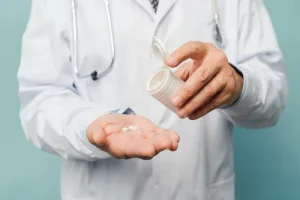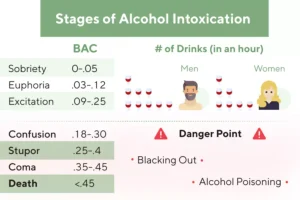
Severely high levels may result in an alcohol overdose and be life threatening. Experiencing even a single incidence of alcohol poisoning could suggest that your drinking behavior is problematic and a cause for concern. Frequent episodes of problematic drinking and high BAC levels could increase the likelihood of alcohol addiction developing.
- Do not wait for the person to have all the symptoms, and be aware that a person who has passed out can die.
- It also increases the risk of unintentional injuries due to falls, drowning, assault, and car accidents.
- Drinking such large quantities of alcohol can overwhelm the body’s ability to break down and clear alcohol from the bloodstream.
- Listen to relatives, friends or co-workers when they ask you to examine your drinking habits or to seek help.
Alcohol poisoning is an emergency
Severe alcohol intoxication — or alcohol poisoning — is a dangerous condition that requires immediate medical attention. If you think someone is experiencing alcohol poisoning, seek emergency medical attention immediately. If you experience an overdose, your doctor will ask you about your drinking habits and health history.
Hospital admissions
People with alcohol poisoning are also more likely to experience injuries, which can be severe. By Buddy TBuddy T is a writer and founding member of the Online Al-Anon Outreach Committee with decades of experience writing about alcoholism. Because he is a member of a support group that stresses the importance of anonymity at the public level, he does not use his photograph or his real name on this website. In addition to being aware of alcohol poisoning symptoms, you should also understand what you can do to prevent it from happening.
What are the symptoms of an alcohol overdose?
In the Gaudiya Vaishnavism branch of Hinduism, one of the four regulative principles forbids the taking of intoxicants, including alcohol. The person can become extremely confused, unresponsive, disoriented, have shallow breathing, and can even pass out or go into a coma. In every U.S. state, it is illegal to drive with a BAC of over 0.08%. A person who drives with a higher BAC is at risk of arrest.

How is an alcohol overdose treated?
Know the danger signals, and if you suspect that someone has an alcohol overdose, call 911 for help immediately. Do not wait for the person to have all the symptoms, and be aware that a person who has passed out can die. Don’t play doctor—cold showers, hot coffee, and walking do not reverse the effects of alcohol overdose and could actually make things worse. American Addiction Centers (AAC) offers state-of-the-art rehab facilities for treating AUDs and is a leading provider of alcohol detox and treatment across the nation. Our treatment programs are tailored to your unique needs and adjusted throughout the length of treatment.
Consider talking with someone who has had a problem with drinking but has stopped. People who want to practice safe drinking can limit their consumption, avoid mixing alcohol with medications or other types of alcohol, and speak with loved ones or a doctor for longer-term support. Medical professionals may recommend additional treatment, such as medications and therapy, for someone who has experienced an alcohol overdose. A BAC level above 0.40% increases the risk of serious complications, including coma and death. Alcohol intoxication is described as a mental and behavioural disorder by the International Classification of Diseases. (ICD-10).[26] Definitive diagnosis relies on a blood test for alcohol, usually performed as part of a toxicology screen.

What tips the balance from drinking that produces impairment to drinking that puts one’s life in jeopardy varies among individuals. Age, sensitivity to alcohol (tolerance), gender, speed of drinking, medications you are taking, and amount of food eaten can all be factors. Take our free, 5-minute substance abuse self-assessment below if you think you or someone you love might be struggling with substance abuse. The evaluation consists of 11 yes or no questions that are intended to be used as an informational tool to assess the severity and probability of a substance use disorder.

Binge drinking
If you or your friend are under the legal drinking age, you might be worried about the legal consequences. But alcohol poisoning is so serious, that not calling 911 could result in death. In any case, it’s unlikely that the paramedics or hospital team will call the police. Most states have Good Samaritan laws, which allow people to call 911 without fear of arrest if they’re having a drug or alcohol overdose or see someone else who is overdosing.
People typically require hospital treatment for an alcohol overdose so doctors can monitor their condition and administer any medications or fluids via IV. Blood alcohol concentration (BAC) is the level of alcohol present in a person’s blood after consuming alcohol. Anyone who consumes too much alcohol too quickly may be in danger of an alcohol overdose, also called alcohol poisoning. This is when BAC may increase to dangerous levels if the person does not receive emergency care.
- By Buddy TBuddy T is a writer and founding member of the Online Al-Anon Outreach Committee with decades of experience writing about alcoholism.
- If you start to vomit in your sleep, you risk asphyxiation.
- Other ways to get help include talking with a mental health professional or seeking help from a support group such as Alcoholics Anonymous or a similar type of self-help group.